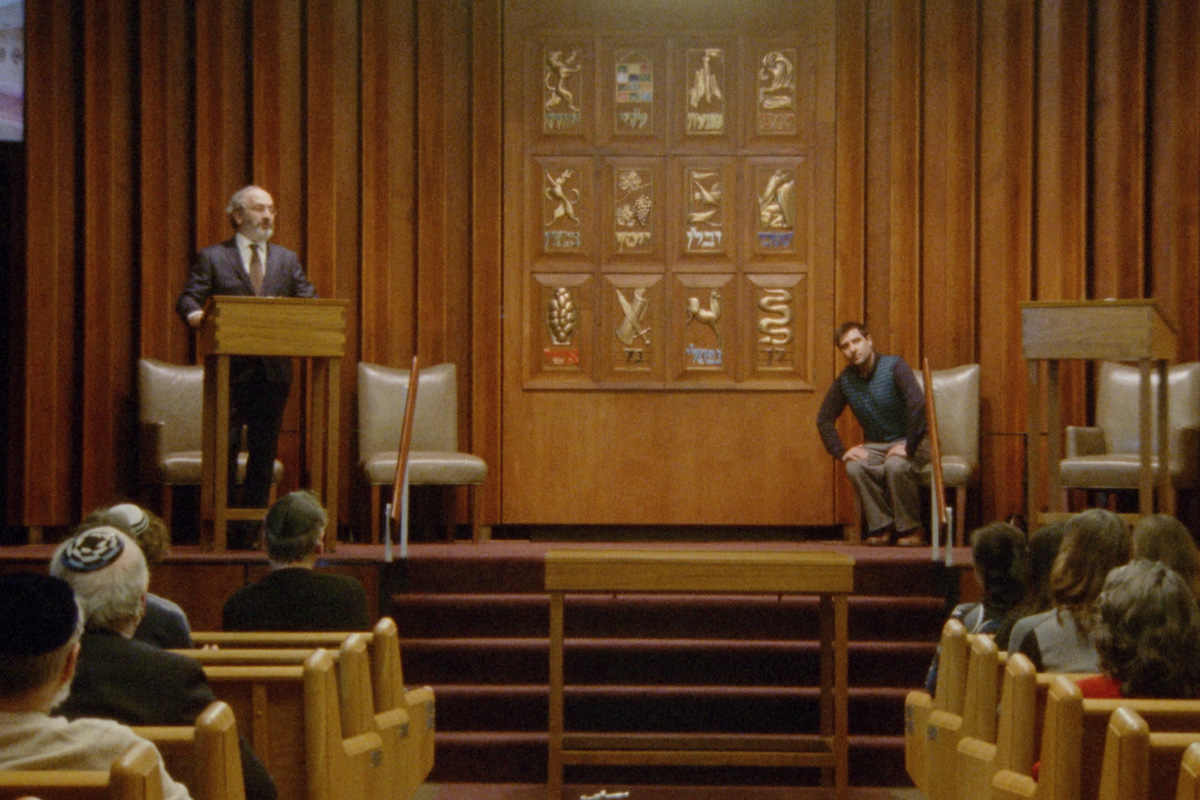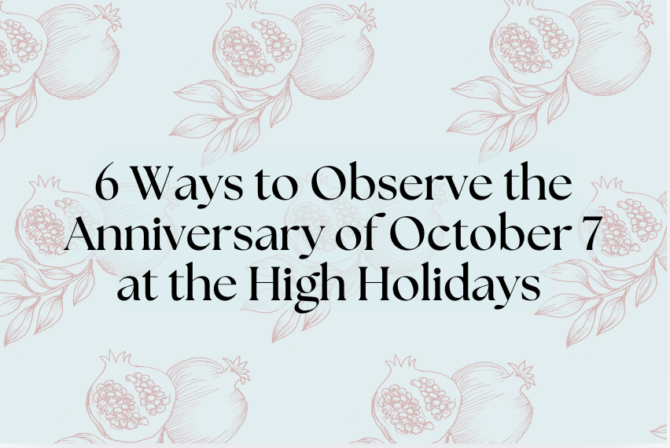Over the past year, every time I happened upon more details about “Between the Temples,” the new Nathan Silver movie out in theaters today, I wondered to myself: “Was this film written specifically for me?” A later-in-life bat mitzvah story and a May-September romance starring the one and only Carol Kane and Jason Schwartzman, who plays a cantor going through a deep personal crisis after the death of his wife? If that wasn’t enough (dayenu!), it also features SNL legend and Triumph the Insult Comic Dog voice (and hand) Rob Smigel as the rabbi (!) of Ben’s childhood synagogue and current boss, and Caroline Aaron (aka Shirley Maisel) as his hippie Jewish mom. It feels like all of my wildest Jewish movie-lover dreams come true.
And so earlier this summer, when I walked into the Village East Theater for an early screening, in what once was the epicenter of Jewish cultural life in America — the Yiddish theater district — and promptly sat myself under the familiar Star of Davids adorning its ceiling, I was terrified. What if this movie didn’t live up to my expectations? How would I report it to my readers after so much kvelling, and perhaps, more direly, how would I deal with the fact that my dream movie was a flop?
Well, I’m happy to report that no such thing happened. “Between the Temples” kept me brimming with Jewish joy and wonder, had me audibly gasping and laughing and even almost singing (to my great surprise, it features my favorite tune from Mizrahi singer Boaz Sharabi), and also kept me firmly connected with the human experiences it explores — personal upheaval, despair, grief, self-inspection and self-discovery.
With a punny title, it could have easily been an irreverent comedy that took advantage of the easy jokes you can make at the expense of its subjects, making a mockery of age-gap relationships and overbearing Jewish mothers. Instead, “Between the Temples” is, as its name suggests, cerebral and thoughtful about everything, never relying on any easy trope or cheap humor. The relationship between Schwartzman’s Ben Gottlieb and Kane’s Carla O’Connor unfolds slowly and beautifully, both seeing in each other something that no other person has ever seen in them before. Its portrayal of Jewishness feels both incredibly grounded in tradition and completely fresh. There’s a chaotic Shabbat dinner scene in which inconvenient truths explode in people’s faces that’s a true cinematic masterpiece, and then the most tender and spiritual bat mitzvah scene I’ve ever seen (and I’ve seen many). It made all my dreams come true and then some.
When I talked to Nathan Silver and star Rob Smigel, who quite like the movie itself, didn’t disappoint in their openness and wisdom, earlier this month, I didn’t ask if the movie had been made for me specifically (that would be creepy, I think?) but I did ask about my favorite Jewish scenes, that surprising Mizrahi song and about Triumph the Insult Comic Dog’s Jewish roots:
I loved the movie so much. I came out feeling kind of high.
Nathan Silver: Thank you!
Rob Smigel: Me too!
Maybe it was just being a sleepless mother of two…
Smigel: I highly recommend being a sleepless mother of two if you’re seeing this movie.
It’s a delirious experience! It had my favorite bat mitzvah scene and my favorite Shabbat scene that I’ve ever seen.
Silver: Oh, wow, that means a lot.
How does the Shabbat dinner in the movie compare to a typical Shabbat dinner in your homes?
Silver: I didn’t grow up with Shabbat dinners. I have been to a few friends’ Shabbat dinners. But I’m a cultural Jew, so unfortunately, or fortunately, I find my Judaism in Jewish humor and the like. But I think the energy and the chaos of that scene comes from my family meals from childhood.
Smigel: In my house, my Shabbat dinners are pretty mellow. It’s just the four of us, me and my wife and my twin boys, and it’s much more mellow. Nobody’s bringing anybody objectionable… No, it’s wonderful. It’s a ritual that I’ve sort of adopted once we had the boys, and we just talk about our week, our favorite moments. And then we say the prayers — we say the prayer for the children, which is always one of my favorite moments of the week.
It’s so grounding. The bat mitzvah scene reminded me of those moments where Judaism is so grounding, so beautiful and something that you can own for yourself.
Smigel: The first time I saw the movie. I was very emotional at the end from that bat mitzvah scene, because it just embodies so much of what’s beautiful about this religion, and religion in general, when it’s applied right.
Nathan, did you always know what the bat mitzvah scene was going to be?
Silver: It was always the plan for it to take place in her backyard. And we were searching for the right place for a long time. And it just so happened that our script supervisor was friends with someone who had a house close to where we were shooting… and her neighbor was very much like the Carla character. So it was total kismet.
Smigel: I don’t know if this is a spoiler, but when the camera pans at the end to just the landscape, to just the trees, I mean, what a powerful statement, right? Our whole religion is rooted in humility and that’s really getting at the heart of it — just being awestruck at this miracle.
It’s so beautiful! Rob, did you take inspiration from any specific rabbi for this role?
Rob Smigel: There’s not a specific rabbi that I was inspired by, but you know, I’ve lived a pretty long life, been through a lot of rabbis.
So you borrowed a little from here…
Smigel: Yeah, a little bit here, a little bit there, and not necessarily all rabbis. Sometimes authority figures at a summer camp. But yeah, there’s certain moves that I grabbed, like over-articulating when you’re talking to the congregation. You know that kind of illusion of being erudite simply by over-enunciating.
Oh yeah, that was very familiar. I also felt like he was such a Jewish dad, with that tie with the pictures of his children.
Nathan Silver: Oh yeah, that tie was a great idea.
My coworker just recently told me about getting her dad socks with her children’s faces on them. I was like, oh, this is so real!
Smigel: I have a quilt with all my kids. [Reader, he lifted the quilt up and it was glorious!]
What Jewish dad doesn’t want merch with his children’s likenesses?! Find me one!!
Rob Smigel: That’s what my parents were like, too.
So I’m Israeli, and the music was really, really touching for me to hear. They’re the songs of my childhood, from Arik Einstein to Boaz Sharabi’s “Pamela,” which is one of my favorite songs of all time. It made me really rejoice at having a little Mizrahi representation.
Silver: It was thanks to our editor, John McGarry, who’s a goy, whose friend had this record collection where we pulled all these songs from. And then our music supervisors helped out and gave us some additional ones, but we kind of looked at it as though these are the songs that Jason’s character was listening to. So it’s funny that you say you grew up on this.
It gave me a little moment of pride that was clean in these complicated times. It was nice to see all the audience also enjoying it around me.
Silver: “Pamela,” that song is a favorite of our music supervisor, Melissa. She was like, it needs to be in there. I’m gonna fight for this song.
Nathan, what was the Jewish experience of making this movie like for you? This is such a Jewish spiritual movie. Was it almost like a bar mitzvah experience for you?
Silver: I learned a lot about the traditions and rituals. I [previously] knew some things vaguely, but we had a rabbi as a consultant for the script writing phase, and then for when we got closer to production: Jesse Miller, who was also a co-producer on the movie. When he’s not producing, he tutors kids for their bar and bat mitzvahs.
That’s so great!
Silver: His grandfather is a famed rabbi, so we learned a lot from him. And the thing about Judaism is, so many things are done differently in each synagogue, and it’s so dependent on the rabbi and this and that. So every question we had was met with a million answers. And that became the core of the movie, which was just like, it’s all about questioning at all times. Like, that’s just Judaism.
And it’s life.
Silver: And it’s life.
What did your mom think about the movie? The most important critic!
Silver: She loved it, and she has now seen it, I think, five or six times, and will see it again I don’t know how many times. She’s in love with this movie. The seed of the movie came because I was making a documentary about her, and while shooting it, I found out that she was going to get her bat mitzvah at 65. She didn’t end up going through with it. She’s still a part of the temple. It’s actually the temple we shot at. So, yeah, it kind of came from there. And then I relayed that fact to Adam Kersh, who would end up producing the movie, and he’s like, “There’s a movie here, if you do a kind of ‘Harold and Maude’ riff off a woman who’s getting a late in life bat mitzvah, and she falls for her younger cantor or rabbi.” That was back in 2018, and Adam kept pushing this on me. He was like, you gotta do it. You gotta do it! And so finally I relented, and this whole thing came together.
Carol Kane is the perfect person for the role, because who doesn’t watch her onscreen and come out with a crush on her? She’s so gorgeous!
Silver: And she’s a force of nature. We were just in LA for press. We took a plane ride back, and the whole time she was just telling me stories about her life. She just has known everyone. She was Betty Davis’s caretaker during her last year alive. Every story that she tells is just like, some insane connection. Like, “I was with Jack Nicholson here, and then Elaine May here, and then John Cassavetes.” And I’m like, you’ve lived such an insane life, and all the directors she’s worked with… She’s incredible.
And you got to work with Rob, who’s a comedy icon.
Silver: It’s the dream I couldn’t believe when he was actually willing to put up with me and do this thing. He’s a comedy hero of mine — “TV Fun House,” all the stuff he’s done with Conan, SNL — and then the movies he’s written. I love “The Week Of” of very, very much. I want people to hunt it down — I don’t think enough people have seen it, and obviously “Leo.” [You can watch both movies on Netflix right now, and I promised Silver I’d tell all of you to watch them. I personally love “Leo” so much.]
And also my favorite Jewish SNL sketch, “Christmastime for the Jews.”
Smigel: Oh, it’s certainly, the one I’ve watched the most, because it’s a song. So yeah, it’s an easy rewatch.
I find myself humming it around Christmas time to counter all the Christmas carols.
Smigel: That’s a happy memory. I got to work with Darlene Love too.
It’s so perfect. And also, I heard Triumph the Insult Comic Dog’s voice was inspired by your Jewish grandparents!
Smigel: A little bit, yeah. My grandparents escaped Russia in the late ’20s because of the revolution, and then they crossed the border to China. They were part of the group of Jews that settled in Shanghai for a while, until Japan conflicted there, and then they worked their way from the Philippines to America. So yes, first-generation immigrant Russian Jews. So that accent was all throughout my childhood. I used to talk like dogs, even when I was 10 years old, that was the voice I would use.
I was like, oh, that’s why this dog sounds so familiar and comforting! He sounds like my Jewish grandparents! This movie is so universal, but it’s also deeply Jewish, what does it feel to have a movie like this out at such a complex time?
Silver: What’s been very heartening is people have connected to it on a very emotional level. And the connection that Ben and Carla have in the film, it’s about people needing people and also people questioning everything in their lives in order to find some kind of life that you want to live, in the world you want to live in. So yeah, it seems people are laughing, at least in the movie, and some people are crying too, because, and it’s nice to see people moved by something.
Smigel: I think it touches on very universal human conflicts and emotions. I feel like it’s a Jewish setting, but I don’t feel like it’s remotely exclusive to Jewish people to appreciate and relate to, any more than “My Big Fat Greek Wedding” was for Greek people.
And that energy is so needed right now. Is there anything you want people to know about the movie?
Smigel: I just love that it doesn’t mock religion in any way. Because as a comedy writer, I just know how easy that is and in society, how easy it is to dismiss religion and associate it only with negatives, like war and world conflict and bigotry. I’m a little bit more observant than the average show biz person, so I kind of cherish what I’ve learned from going to synagogue, and it’s something that doesn’t really come out a lot [in movies and TV], because people just don’t go. I mean, even when I was a kid, I only went on Rosh Hashanah and Yom Kippur and then circumstances led me to go more often. And you really learn how deeply rooted the religion is in humility. There’s a prayer for everything, like before you go to the bathroom.
For every new thing. And we keep making up new ones.
Smigel: Exactly! And even just knowing that that exists, even though I don’t observe to that extent, but just knowing that that’s a part of this religion is very reassuring, to just appreciate the miracle of being here, and it’s really about paying it forward. The way Carol does for Jason: we’re here to help each other.








